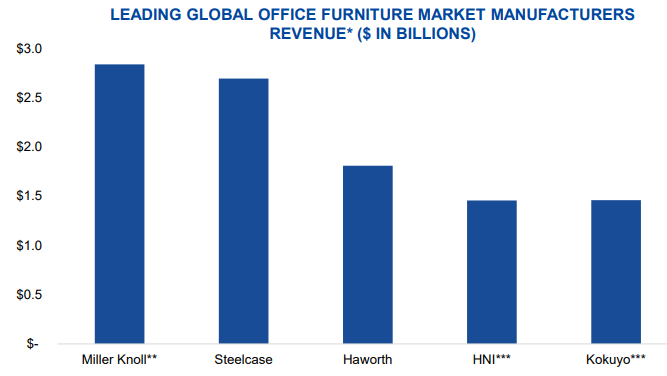The world’s top office furniture manufacturers are Miller Knoll, Steelcase, Haworth, HNI and Kokuyo, according to Steelcase data.
Each of these manufacturers has revenues of more than $1 billion annually, according to most recently released data for the past four quarters and/or internal Steelcase estimates.
Miller Knoll data takes into account the recent merger of Herman Miller and Knoll completed in July 2021, and only the workplace furniture segments (excluding the HM retail and KNL residential segments) were included.
For the cases of HNI and Kokuyo, only included furniture segments were considered.
The Americas office furniture industry is highly competitive, with several competitors offering similar product categories.


The industry competes on a combination of knowledge, product performance, design, price, global service, and relationships with clients, architects, and designers.
For the specific case of Steelcase, approximately 61% of its cost of sales is related to raw materials, components and finished products purchased from a significant number of suppliers around the world.
The raw materials the company purchases that are used in the manufacture of the components and finished products it purchases include steel, petroleum-based products (including plastics and foam), aluminum, other metals, wood, and particle board.
Its global supply chain team continually assesses current market conditions, the financial viability of its suppliers, and available supply options based on quality, supply reliability, and cost.
Office furniture
Material availability has recently been negatively affected by supply chain disruptions.
The prices of many of the raw materials, components and finished products that Steelcase purchases have been affected by significant inflationary pressures.
Steelcase incurred $45.4 million, $48.1 million, and $50.6 million in research, design, and development expenses in 2022, 2021, and 2020, respectively.
In addition, the company sometimes pays royalties to outside designers of its products as they are sold, and these costs are not included in research and development expenses.
The company is focused on improving the efficiency of its manufacturing operations and is also looking to reduce costs through its global sourcing effort.
![]()

